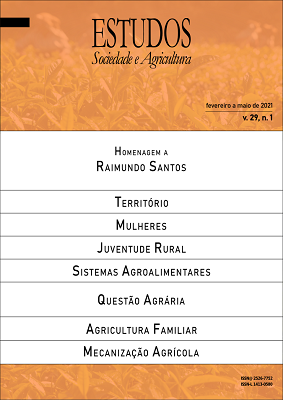Mechanized harvesting of sugar cane: what do industry experts reveal about the motivations and impediments to its adoption in the reality of Alagoas?
DOI:
https://doi.org/10.36920/esa-v29n1-12Keywords:
sugar cane, mechanized harvesting, technology, agricultural mechanizationAbstract
In recent decades, the mechanization of the harvest in the Brazilian sugar cane fields has been intensified. This mechanization of the sugar cane production processes and, more specifically, the harvesting process has been adopted in the state of Alagoas, which has always been one of the main producers in the country. The article aims to investigate the mechanization of the sugar cane harvest in Alagoas from 2008 to 2017, as well as to identify what are the motivations and impediments for adopting such technology. In order to perform the current research study, interviews with sector specialists, field observation and a survey with information of the state and national databases for the development of the research study were used. The results highlight that the harvesting mechanization has not been the same throughout the main producing areas of the country. Furthermore, it highlights that the motivations for mechanization are: the productivity restructuring of the sector, the cost with manual labor, the labor conflicts, the lack of workforce renewal and the adaptation to standards of productive sustainability. As impediments, the following factors are stated: the reality of Alagoas in the labor market, the crisis in the sector and the topography of the area. Lastly, it is expected to contribute in the discussions of the sugar cane scenario in Alagoas, bearing in mind the representativeness of this economic activity to the state and to the North-Northeast region.
Downloads
Downloads
Published
Issue
Section
License
Copyright (c) 2021 José Rodolfo Tenório Lima

This work is licensed under a Creative Commons Attribution 4.0 International License.
Authors who publish in this journal agree to the following terms:
a) Authors maintain the copyright and grant the journal the right of first publication, with the work simultaneously licensed under the Creative Commons Attribution License which allows the sharing of the work with acknowledgment of authorship and initial publication in this journal.
b) Authors are authorized to take additional contracts separately, for non-exclusive distribution of the version of the work published in this journal (eg publish in institutional repository or as a book chapter), with acknowledgment of authorship and initial publication in this journal.
c) Authors are allowed and encouraged to publish and distribute their work online (eg in institutional repositories or on their personal page) at any point before or during the editorial process, as this can generate productive changes, as well as increase the impact and citation of published work (See The Effect of Free Access).






